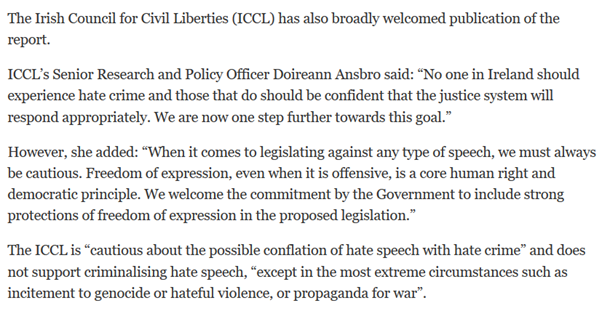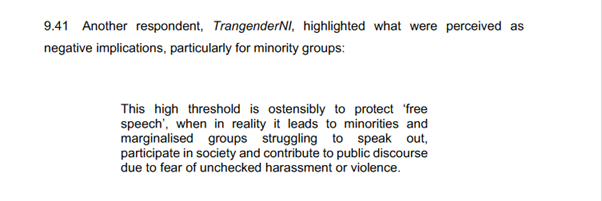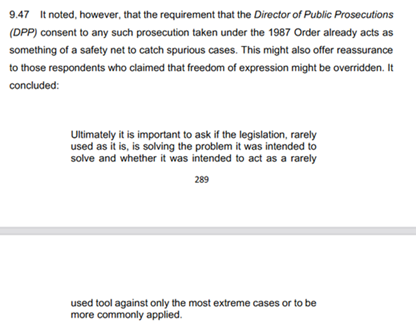How to legislate around the concept of “hate” is currently preoccupying administrations in all parts of the UK and in Ireland, and they are coming to some divergent conclusions. This thread brings together links to all this work.(1/many)
In Scotland, legislation is already before the Parliament and will move into the detailed amending stage in the new year. https://www.parliament.scot/parliamentarybusiness/CurrentCommittees/115036.aspx
In Northern Ireland, a judge-led review has just reported. https://www.justice-ni.gov.uk/news/long-welcomes-completion-review-hate-crime-legislation
For England and Wales, the Law Commission launched a consultation on hate crime in September which closes this week. https://www.lawcom.gov.uk/project/hate-crime/
In Ireland, the outcome of a consultation has just been reported. The government will now develop new legislative proposals, which it plans to publish in the next few months.
http://www.justice.ie/en/JELR/Legislating_for_Hate_Speech_and_Hate_Crime_in_Ireland_Web.pdf/Files/Legislating_for_Hate_Speech_and_Hate_Crime_in_Ireland_Web.pdf
http://www.justice.ie/en/JELR/Legislating_for_Hate_Speech_and_Hate_Crime_in_Ireland_Web.pdf/Files/Legislating_for_Hate_Speech_and_Hate_Crime_in_Ireland_Web.pdf
Conclusions and proposals vary between these exercises on fundamental points including protecting freedom of expression, the coverage of conversations in private, and who should be covered (including whether sex should be included).
In all jurisdictions the breadth of diverging views on laws on stirring up hatred, in particular, is apparent. In Ireland, the Irish Council for Civil Liberties argues for extreme caution in legislating in relation to acts of speech.
https://www.thejournal.ie/hate-speech-ireland-2-5303044-Dec2020/
https://www.thejournal.ie/hate-speech-ireland-2-5303044-Dec2020/
However, in Northern Ireland the review notes that TransgenderNI argues against setting thresholds very high.
https://www.justice-ni.gov.uk/sites/default/files/publications/justice/hate-crime-review.pdf
https://www.justice-ni.gov.uk/sites/default/files/publications/justice/hate-crime-review.pdf
Also in Northern Ireland, the Church of Ireland Church and Society Commission summarised the core tension here: are these laws intended to be used for very rare events only or to have a wider effect? The rhetoric in Scotland has suggested different things at different times.
Although proposals for legislation in this area have often proved unusually controversial, one common theme is that plans to revisit hate crime legislation have tended not to be included in manifestos (based on a word search for “hate”).
In Scotland, the SNP in 2016 said only “We will aim to ensure that all police officers receive appropriate training to support the investigation of hate crimes”.
For England and Wales, there was no reference to plans to legislate in this area in the Conservative’s 2019 manifesto.
In Northern Ireland no plans to legislate were included in the last round of manifestos (2017) for the largest parties (DUP, Sinn Fein). Two smaller parties (SDLP, Alliance) refer to hate crime, though only the SDLP referred to revisiting the legislation (in 2016: 2017 not found)
Going back further, the Labour manifesto in 2005 did not discuss the extension of stirring up hate offences in England and Wales which took place between 2005 and 2010.
The exception is Ireland. Work was already underway when the 2020 elections were held and Fianna Fail and Fine Gael both committed to taking it forward. But the previous Fine Gael govt which began this work did not include plans to legislate here in its 2016 manifesto.
How to legislate around the concept of hate therefore turns out to be treated typically as a legal/technical issue, rather raising issues of principle that require an electoral mandate.
That legal experts and interest groups (including those representing women) have come to different conclusions in neighbouring places brings home how hard the judgements here are.
It is a pity that it has not been possible to look at the conclusions of all these near-contemporary reviews, as rich sources of divergent analysis, including legal analysis, before legislating in Scotland.
Some of the variation reflects different social & legal starting points, but much of the discussion in all the reports is at the level of principle that applies beyond particular borders, where sharing ideas might not simplify the process but might be of collective benefit. /ends
Although the public statements on plans for Ireland have been strong on protecting freedom of expression, concerns are still being expressed there about the scope for chilling effects, as for example here. https://twitter.com/iseult/status/1340811439477547010?s=20

 Read on Twitter
Read on Twitter




